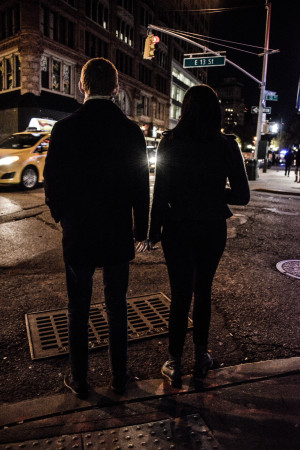When we don’t talk about love
November 30, 2015

At the end of the third date, there was a sense of expectation. I stood there, awkwardly using my umbrella as a kind of cane and not quite sure what to say in this situation. In a brilliant showing by my sympathetic nervous system, I decided to say, “I’m bad with physical contact,” and run away. I learned a lot about myself that day.
Up to that point, my aversion to human contact was what I would call a lovable quirk. People could just roll their eyes when I avoided hugging and, being Irish, it wasn’t like there were a lot of kiss-on-the-cheek hellos in the family. For the majority of my life, I assumed that if I were in a romantic context I would get over it and it would be fine. But that wasn’t what happened, and that made things far more complex.
To clarify, it is not as though I am against physical contact in theory — in fact it’s the opposite. I compare it to skydiving: it’s very easy to say, “Yeah, I would totally do that,” but things change when you’re actually at the door of the airplane.
Trying to figure out what is blocking me from contact has required a decent amount of self-psychoanalysis. This is a strange concept: needing to sit down and stir through theories about why you are able or unable to do something. And in darker moments, it has led to the idea that perhaps I’m fundamentally broken and will never be able to truly connect with another person. However, the root cause of this loneliness falls somewhere else.
One thing I’ve determined is that I have a set of relationship schemas. These are a set of rules that define how a relationship should work. You meet, you get coffee, you go on a date and on and on until death. One of these steps is, of course, first kiss. Attempting this is where I discovered that maybe my schemas are wrong.
If I had to blame anything for forming these arbitrary rules, it would be sitcoms — which I watched a lot of. These created the illusion for me that there is a correct way for a relationship to work. Unfortunately, people don’t always fit perfectly into a “Seinfeld” plot. They do not operate through schema, and each relationship is different because not everyone can be classified as a Jerry, Kramer, George or Elaine.
This is not to say that I was consciously mapping out relationships. But when the same narrative gets told enough times, it becomes embedded into the mind. The world is inundated with voices that tell us what love is like, and it is only possible to hear the loudest voices in this conversation. The loudest are not always the best.
The only way to fight this is to recognize the random rules we have accumulated and develop a more complex idea of what love can be. People need to talk to one another and look within themselves to find out what they want, not what they’re supposed to want. We cannot learn about love using someone else’s definition.
Figuring out relationships without schema is hard. It’s much easier to just follow a script than to have to tell the person you’re with that you’re not comfortable kissing them yet. But the discussion is worth it.
This would be a good place to talk about how I have found someone who has helped me through my idiosyncrasies. Unfortunately, I can’t because that hasn’t happened, and I generally don’t talk about this aloud. All the more reason to start.
Lastly, a case for why we need to talk about love in the first place. It can seem like it is a frivolous topic, but love impacts all of us deeply. If we want to connect with others, we cannot try to fit them into the vision of how we see the world. And at the very least, talking to others about love is a great starting point to loving others.
